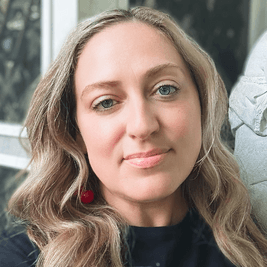Heidi's Story: A Positive Genetic Test Empowered Me to Be Proactive

Heidi A. Roepke is a Breastcancer.org Community member in Ames, Iowa, USA.
I lost my mom 20+ years ago to breast cancer — she was diagnosed before age 50 (age 46), and died at age 51 after a recurrence with a more aggressive cancer. I remember her saying she thought it could be hereditary, but BRCA genetic testing was just emerging at the time, and she wasn't tested, as far as I know.
I decided long ago that if it ever became an option, I would be tested and I would absolutely have preventive surgery. Why take any chances? After breastfeeding my second and last child, I decided, "Why am I still waiting to get tested?" I reached out to my primary care provider about it, and she referred me to a genetic counselor in our clinic/hospital system. The genetic counselor was so knowledgeable and I found all the information fascinating.
Of course we can never know 100% for sure, but it's almost certain my mom got her pre-age 50 cancer due to being positive for a BRCA1 mutation, which I also tested positive for. In particular, it is a Norwegian variant of a BRCA1 founder's mutation, and my aunt has traced the geneology from my father's side, and we know they are not Norwegian. But, it is well-known that my mom's side has Norwegian roots, even before my BRCA1 mutation diagnosis, so I almost certainly inherited it from my mother.
Since then I've had all the preventive surgeries for breast and ovarian cancer, along with breast reconstruction. Knowing my genetic status was extremely empowering, and though it's never a 100% guarantee against cancer, it was truly life-changing for me. I hope I can be around for my children now for much longer than my mom could be. So grateful for the science and dedicated people behind every part of the process.
I wish people knew that having a BRCA1 mutation is a diagnosis in and of itself, called "Hereditary Breast and Ovarian Cancer Syndrome," and it means that more frequent scans and surgeries, including reconstruction and revisions, are then covered by insurance (or more likely to be covered). I know not every insurance is equal, but that's what it meant for me. I also wish every step was guaranteed to be covered by insurance for everyone, especially if they have a family history of cancer.
I also wish people knew that there are thousands of variants of BRCA, and direct-to-consumer testing like 23andMe will not find all the possibilities for variants — only a select few. Testing through your doctor/genetic counselor is the way to go. I wish people knew that if they have a mutation, they have it whether they know it or not. Knowing has been so empowering and actually anxiety-reducing for me. My mom's early cancer is no longer the terrifying mystery it once was.
I also wish people knew that many people have genetic testing and preventive surgeries for breast cancer, and have no regrets or very few regrets. It is not an "extreme" choice, or a choice made simply "out of fear" — although I also wish people knew for people with a family history, this is also a very real and valid fear. I wish people knew knowing your status doesn't automatically mean you have to have surgery, and that talking to a surgeon about your questions and concerns can really ease your mind.
I wish people knew how empowering being able to take preventive action can be, and how much it has diminished my anxiety. And I wish people had empathy for how life-changing a cancer diagnosis is, as I experienced with my mom. If I can prevent my kids going through that as much as I possibly can, and be an example for them on being proactive on cancer prevention, then I have succeeded.